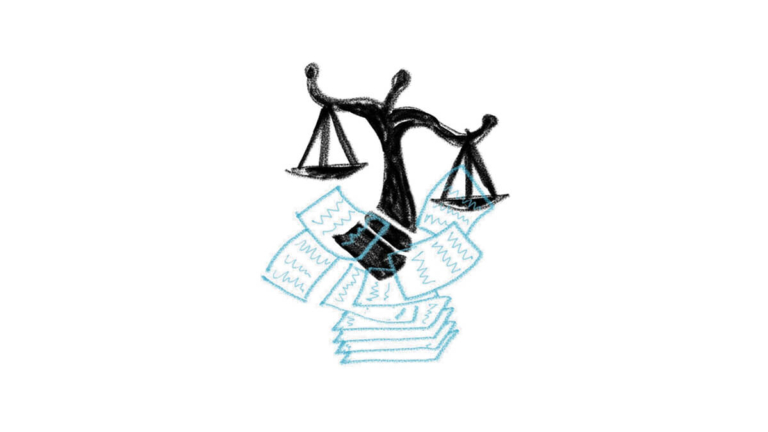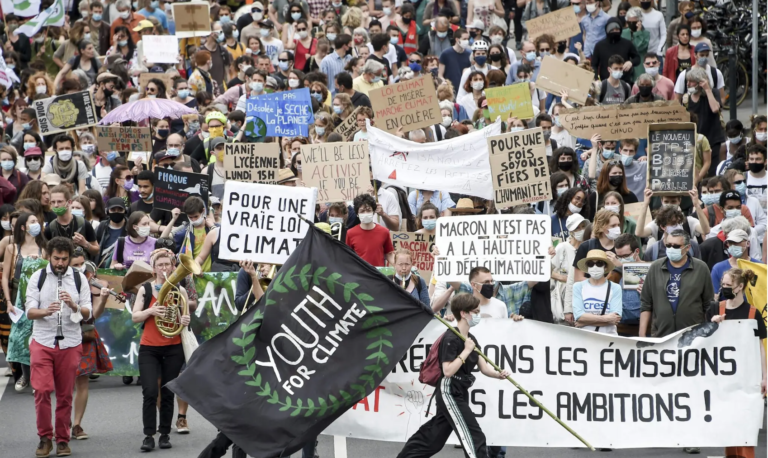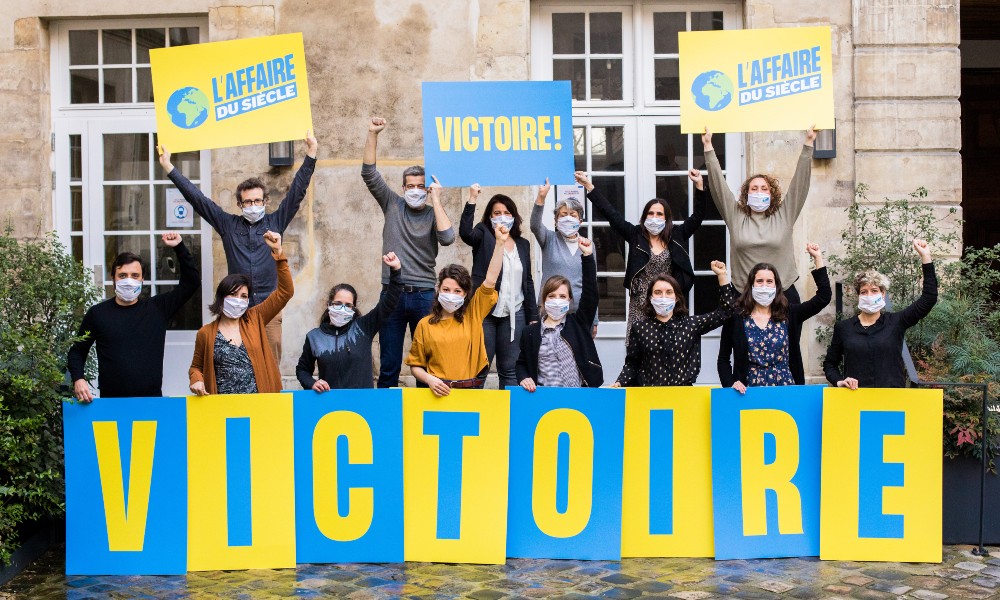Casebook Info
Around the world, lawyers are taking to the courts to hold governments accountable for their climate commitments and to challenge inadequate measures for the climate emergency. In France, a group of NGOs filed one such case – Notre Affaire à Tous v. France – to push the government to take adequate climate action in line with its legal obligations. In an important decision, the Administrative Court of Paris agreed, ordering the government to take urgent action to reduce its greenhouse gas emissions in line with its international commitments and domestic obligations.
- Year Filed 2018
- Year of Most Recent Ruling 2021
- Year of Final Ruling 2021
- Jurisdiction France
- Court Name Administrative Court of Paris
- Primary Focus Mitigation
- Ruling On Merits
- Plaintiff(s) NGOs [Fondation pour la Nature et l’Homme (FNH), Greenpeace France, Notre Affaire à Tous and Oxfam France]
- Respondent(s) French government
- Outcome Ruling for the plaintiffs
- Organizational leader of the litigation Notre Affaire à Tous
Background
Notre Affaire à Tous v. France reveals the powerful ripple effect that the Dutch Urgenda v. Netherlands decision had on the climate movement. Indeed, the NGO Notre Affaire à Tous was formed after the historic Urgenda judgment to bring similar litigation in France. This case – Notre Affaire à Tous v. France – was part of that effort and one of the first climate cases in France. And just like in the Urgenda case, the (in)adequacy of government action on climate change was at the heart of the litigation.
In this case, the plaintiffs alleged that the French government’s inaction on climate change and failure to meet its own GHG emission reduction goals, increase renewable energy, and limit energy consumption violated its legal obligation to tackle the climate crisis. They argued that the government delayed, or refrained from, adopting measures to eliminate or at least limit climate hazards and risks and had not implemented any mechanism for monitoring and evaluating these necessary measures. This situation revealed, according to the plaintiffs, the overall inadequacy of the measures adopted, when any such measures were adopted at all.
The plaintiffs reasoned that the state’s obligation to tackle the climate crisis derives from general legal duties under the French Charter for the Environment, the European Convention on Human Rights (ECHR), and the general principle of law affirming the right of every person to live in a sustainable climate system. They argued that these rights require states “to implement a legislative and regulatory framework and to adopt practical measures meant to fight efficiently against climate change.” The state, moreover, has “specific” obligations, according to the plaintiff NGOs, under EU and national law to mitigate GHG emissions and to take action to prepare for the impacts of climate change.
The plaintiffs asked the Administrative Court of Paris to order the state to fulfill its climate obligations by: (1) taking proper measures to reduce atmospheric GHG emissions; (2) taking all necessary measures to achieve France’s targets for reducing GHG emissions, developing renewable energies, and increasing energy efficiency; (3) taking the necessary measures to adapt the national territory to the effects of climate change; (4) taking the necessary measures to protect citizens’ lives and health from the risks of climate change; and by (5) paying the symbolic sum of 1 euro for moral damages.
In October 2021, the Court sided with the plaintiffs, agreeing on the existence of general duties under the French Charter for the Environment to take adequate climate action as well as the above-mentioned specific duties. The Court, as a result, ordered the French government to take immediate and concrete actions by the end of 2022 to repair the ecological damage caused by its inaction on climate change and comply with its GHG emission reduction commitments.
The damage generated by the government’s inaction amounted to, according to the Court, 15 million excess tons of GHG emissions between 2015 and 2018. Consequently, the government was called on to incorporate these excess emissions into the country’s emission reduction goals for 2021 and 2022. The Court also ordered the state to pay compensation for any future failure to limit GHG emissions to the country’s emission commitments. Like in most climate cases, however, the Court left the government a margin of discretion to choose the specific methods of compliance.
- 15 million Extra tons of emissions that France emitted from 2015-2018 relative to its international commitments
- 2.3 million Members of the public who signed a petition supporting the case
- 1 Number of years the Court gave France to take concrete actions to repair its ecological damage
Strategies
Centering rights

Fundamental rights laws and texts, such as the European Convention on Human Rights (ECHR) and the French Charter for the Environment, served as a major basis for the plaintiffs’ argument for the existence of government obligations to take meaningful climate action.
Moreover, though the Court did not reference this line of argumentation in its decision, the plaintiffs also used rights-based arguments to make innovative claims, including the existence of a right to live in a sustainable climate system – a general principle which has not yet been explicitly recognized by French law. In making this argument, the plaintiffs reminded the Court that general principles arise from “the requirements of legal consciousness of our times.” Such legal consciousness includes, according to the plaintiffs, the now well-known link between a safe climate and the enjoyment of human rights as well as domestic and international laws and treaties obliging states to adopt policies that protect the environment and promote sustainable human development.
Tying countries’ / corporations’ climate and human rights obligations to international climate and environmental law, including, for example, the temperature target established by the Paris Agreement

The plaintiff NGOs based much of their argument for the existence of a fundamental right to a sustainable climate system on the recognition of the close link between tackling climate change and promoting sustainable development as laid out in various domestic and international texts. Of special significance are: the Stockholm Declaration, the World Charter for Nature, the Rio Declaration, the United Nations Framework Convention on Climate Change (UNFCCC), the Kyoto Protocol, the Paris Agreement, the EU 2020 Climate Action and Renewable Energy Package, and decisions of the European Parliament. In this way, the plaintiffs tied the creation of a fundamental right in France to the substance of international climate and environmental law and precedent.
Climate and environmental law also more broadly underpin the plaintiffs’ argument that the government failed to meet its climate obligations. For example, they argued that the French government failed to satisfy its adaptation obligations because its adaptation plan was not updated in time to be brought into conformity with the new national and international normative framework – in particular, the Paris Agreement. The adaptation plan, thus, cannot be considered an adequate measure in response to the climate emergency and contributes to the violation of the government’s obligation to tackle climate change. In other words, in addition to using international climate and environmental law as the source of rights that reinforce the state’s duty of care to fight climate change, the plaintiffs also use these laws as a metric to establish the state’s failure fulfill this duty of care.
Not only do the plaintiffs establish the state’s lack of action, but they also establish the state’s inadequate action vis à vis international climate and environmental law. More specifically, the plaintiffs argued that the increase of GHG emissions in France – informed by and in contrast to IPCC recommendations and commitments made under the Paris Agreement – is enough to prove either the inadequacy of state action plans, strategies, and programs or the state’s failure to enforce them. In making its decision along these lines, the Court referenced these sources of international and environmental law.
Applying a developed body of law in the context of climate change

Much of the complaint is based on legal concepts and theories that are well-known to French courts. More specifically, as in the Urgenda case, the plaintiffs evoked a state duty largely derived from binding constitutional and human rights sources. For example, the plaintiffs root the government’s obligation to take climate action partly in the observation that the consequences of climate change directly affect fundamental rights. Such fundamental rights include the right to live in a healthy environment (French Charter for the Environment, which is a constitutional text); the right to life (Article 2 of the ECHR); and the right to respect for private and family life (Article 8 of the ECHR). The plaintiffs reminded the Court that, with respect to these principles, administrative courts “have condemned the State many times because it failed to fulfill its obligations regarding public health or environment.” The plaintiffs strategically reminded the Court that government obligations to act were found with respect to a range of environmental rights issues – from asbestos and air pollution to green algae – and in which scientific standards were used to assess the behavior of the state. They therefore imply that this case is not a drastic change of affairs – it’s simply asking the Court to apply its prior logic and precedents in the context of climate change.
The plaintiffs also root their claims of harm and requests for remedy in other established sources of law. They specifically pull the definition and criteria of ecological prejudice they deploy from the French Civil Code – an established and respected source of law among French courts. Consequently, using this, the plaintiffs were able to broaden their requested remedy, as ecological prejudice entitles them to compensation or, at minimum, to request that the Court prescribe the measures needed to end such prejudice and prevent further aggravation.
Affirming country / corporate responsibility for their ‘fair share’ of emission reductions, regardless of the actions of other countries or corporations.

The fair share norm informed the plaintiffs’ request for remedies. More specifically, when asking the Court to order the government to take proper measures to reduce its emissions, they asked that the state do so “in due proportion considering global emissions and taking into account the particular responsibility accepted by developed countries at a level compatible with the objective to contain the rise of the average temperature of the planet below the threshold of 1.5 °C compared to pre-industrial levels.” In this way, the plaintiffs reminded the Court of the role of developed countries – responsible for the majority of historical GHG emissions – in the climate crisis and the corresponding responsibilities they have to mitigate it.
Using a carbon budget

The Court, in line with the plaintiffs’ reasoning, framed the harms generated by the government’s inaction in terms of the GHG emissions that ate up the state’s initial carbon budget. The carbon budget is a recognizable concept that was relatively easy for the Court to understand and utilize as a metric to measure the adequacy of state action.
“[I]n line with the commitments that it had made within the framework of the first carbon budget, which it failed to respect, the State must be regarded as responsible […] for part of the ecological damage observed.”
Take-aways
The case showcases the power of climate litigation that deploys a political strategy in addition to a strictly legal strategy.
Beyond its success in court, the case’s successful media campaign mobilized a large number of French citizens and put the topic of climate change at the center of public attention during a period of political elections.
At the same time, the case suggests that citizens may be taking to the courts to tackle government inaction on climate change.
This trend is also visible in the prevalence of cases supported by crowd-funding campaigns.
All in all, the case affirms the potential power of climate legal action.

Impacts
The case reinforced the ability to challenge government acts and omissions inconsistent with climate protection.
As part of a successful media campaign, 2.3 million members of the public supported the case by signing a petition, which was then submitted with the court filings. While this is not the first case to enjoy widespread public support – the Belgian case VZW v. Kingdom of Belgium, filed in 2015, had almost 60,000 citizens registered as co-claimants – it is nonetheless the greatest known level of support for a climate case to date. Likely due to such widespread support, the plaintiff NGOs were invited to a meeting at the cabinet of the French prime minister, which was widely covered by the press and sparked a nationwide political and legal debate on climate issues.

Credit: Thomas Samson / AFP / Getty Images

